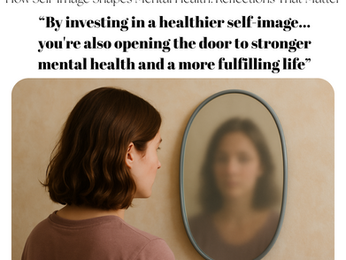Search


What is an anchor in mental health?
An anchor is a reliable cue, practice, or relationship that helps you steady your nervous system when emotions surge. Think of it as the thing you reach for when stress pulls you off course, a simple touchstone that brings you back to the present with a little more safety and choice.
Deborah Marks
Oct 7, 20254 min read


Why “Doing Nothing” is a Powerful Mental Health Tool
In a world that praises productivity and busyness, the idea of “doing nothing” can feel uncomfortable or even wrong. Many people associate rest with laziness, fearing that slowing down means falling behind. But from a mental health perspective, the practice of intentional rest is not only beneficial, it’s essential.
Deborah Marks
Sep 17, 20252 min read


Political Violence and the Strain on Our Mental Health
When political violence becomes front-page news, many of us feel shaken, unsafe, and even disoriented. The recent assassination of Charlie Kirk, fatally shot while speaking at Utah Valley University on September 10, 2025, drives home how fragile civic life and public discourse can be in times of extreme division.
Deborah Marks
Sep 16, 20254 min read


The Psychology of Values: Unlocking Better Mental Health
Every person has a unique set of values that guide their choices, shape their relationships, and influence their sense of purpose. These values are not just abstract beliefs; they serve as the foundation of our wellbeing. When our daily lives align with what we value most, we tend to feel more balanced, fulfilled, and mentally healthy. When there is a disconnect, however, stress, anxiety, and dissatisfaction often arise.
Deborah Marks
Sep 12, 20253 min read


The Psychology of Nostalgia: Why We Crave the Past in Stressful Times
Nostalgia often sneaks up on us in surprising ways. It might be a song from our teenage years, a scent that reminds us of childhood, or a photo that instantly transports us to a simpler time. In moments of stress or uncertainty, many people find themselves craving these comforting glimpses of the past. But why is nostalgia so powerful, and how can it be used therapeutically to support mental health?
Deborah Marks
Sep 11, 20252 min read


Decision Fatigue: Why Small Choices Can Feel Overwhelming
Do you ever feel drained just from deciding what to wear, what to eat, or which task to start first? This isn’t just stress - it’s something called decision fatigue. Our brains are wired to make choices all day long, but the more decisions we make, the less mental energy we have left. Over time, even the smallest choices can feel overwhelming.
Deborah Marks
Sep 10, 20252 min read


Community and Mental Health
In a world where many people feel increasingly isolated, the role of community in supporting mental health has never been more important. Whether it’s family, friends, local groups, or professional networks, the sense of belonging and connection that community provides can act as a powerful buffer against stress, anxiety, and depression.
Deborah Marks
Sep 9, 20252 min read


How Self-Image Shapes Mental Health
The way you see yourself influences almost every aspect of your life. Self-image is more than just how you look in the mirror; it’s the collection of beliefs, feelings, and assumptions you carry about who you are. A critical or distorted self-image can quietly chip away at your confidence, contributing to anxiety, depression, and relationship struggles. By contrast, nurturing a kinder and more balanced self-view supports resilience, self-esteem, and emotional wellbeing.
Deborah Marks
Sep 8, 20252 min read


The Intersection of Climate Anxiety and Mental Health
Australia is no stranger to extreme weather. In recent years, bushfires, floods, and prolonged droughts have left lasting scars on communities and individuals alike. Beyond the physical destruction, these events are fuelling a growing phenomenon known as climate anxiety, a sense of fear, hopelessness, or overwhelm about the state of our planet and its future.
Deborah Marks
Sep 2, 20252 min read


Micro-Moments of Connection: Small Interactions That Improve Wellbeing
It’s human nature to underestimate the power of small gestures, but their impact on mental health is profound. Each positive interaction helps release oxytocin, the hormone that fosters trust and reduces stress. In a world where loneliness and disconnection are rising concerns, even a passing moment of connection can help lower anxiety, lift mood, and remind us that we’re not alone.
Deborah Marks
Sep 1, 20253 min read